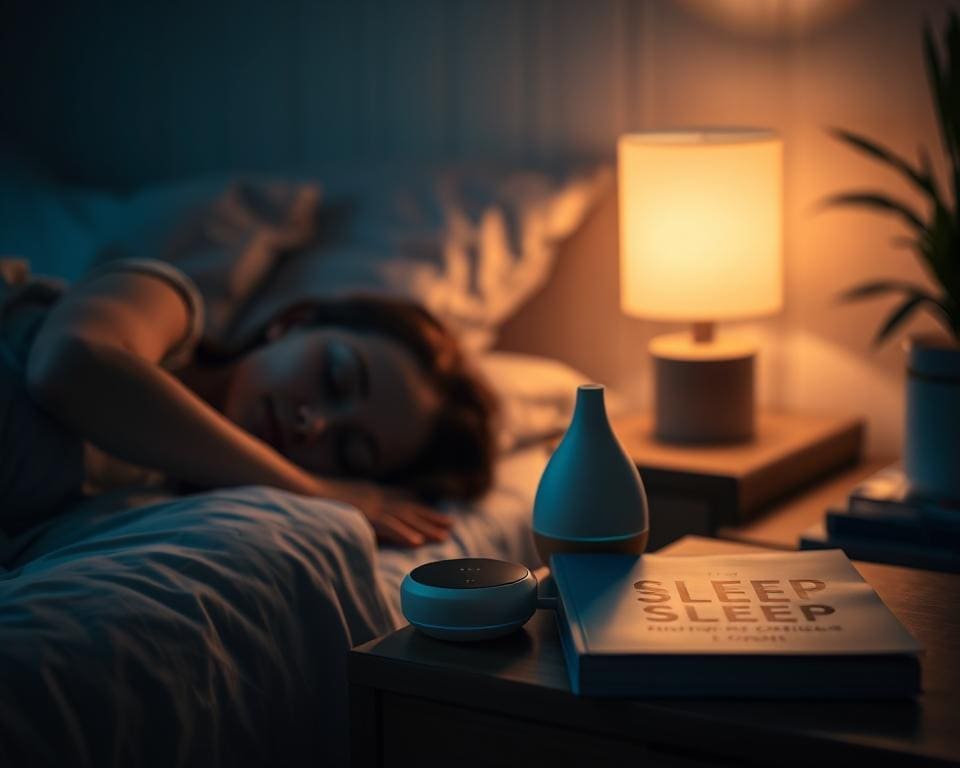In today’s hectic world, many individuals are searching for effective ways to enhance their nightly rest. Establishing evening routines for sleep can play a pivotal role in improving sleep quality and fostering overall well-being. The necessity of proper sleep is underscored by findings from the National Health Service (NHS), which reveal that a significant number of adults face difficulties due to various stressors and lifestyle choices. By embracing simple yet profound rituals, you can unlock invaluable sleep better tips that pave the way for restorative slumber.
Understanding the Importance of Evening Routines
Establishing an evening routine can significantly enhance sleep quality. The science of sleep reveals intricate mechanisms that govern how we progress through sleep cycles, each essential for restoring our bodies and minds. Research indicates that sleep is not uniform; it consists of light sleep, deep sleep, and REM sleep, each serving vital functions in memory consolidation and emotional processing.
The Science Behind Sleep
Understanding the science of sleep involves recognising that our bodies follow natural rhythms. Sleep cycles typically last about 90 minutes, during which our brain transitions through various stages. These stages play distinct roles in promoting physical health, cognitive function, and emotional wellbeing. Optimal sleep leads to improved performance during waking hours, making it crucial to prioritise healthy sleep habits.
How Routines Impact Sleep Quality
Implementing evening routines has multiple benefits, including signalling to the brain that it is time to wind down. Activities such as dimming lights, avoiding screens, and participating in calming practices can assist individuals in transitioning from daily stress to restful sleep. The benefits of evening routines extend beyond just aiding sleep; they foster a sense of preparedness for the coming day, allowing for improved focus and clarity upon waking. By dedicating time to unwind, individuals can create a soothing atmosphere that promotes more restorative sleep cycles.

Evening Routines That Help You Sleep Better
Creating a serene space within your home significantly influences your sleep quality. A calming bedroom environment not only aids in falling asleep but also enhances the duration and depth of your slumber. Focus on establishing a sleep-friendly atmosphere by considering various elements that contribute to relaxation.
Creating a Calming Atmosphere
To achieve a calming bedroom environment, start by eliminating distractions that could disrupt your peace. Utilising blackout curtains can effectively block out unwanted light while enhancing the cave-like ambience conducive to sleep. Complement this with white noise machines or calming sounds to mask any disruptive noises from outside.
Integrating soothing scents, such as lavender or chamomile, can further promote relaxation. These fragrances have been known to reduce anxiety, making it easier to drift into restful sleep. By fostering an inviting, tranquil setting, your chances for a restorative night’s sleep increase significantly.
Optimal Room Temperature for Sleep
Maintaining the ideal sleeping temperature plays a critical role in facilitating quality slumber. The recommended range lies between 16°C and 20°C, as this cool setting contributes to a sleep-friendly atmosphere. A bedroom that is too warm can lead to restlessness and frequent awakenings throughout the night.
To customise your environment, consider using fans or air conditioning systems to achieve and maintain the optimal room temperature. This tailored approach supports the body’s natural cooling process, signalling it’s time for rest. By prioritising these adjustments, you enhance your overall sleep experience.
Mindful Practices for Better Sleep
Integrating mindful practices into your evening routine can significantly enhance your sleep experience. Two powerful techniques that promote restful nights are meditation for sleep and journaling. These practices foster relaxation and mental clarity, making it easier to drift into slumber.
Incorporating Meditation
Meditation for sleep has gained popularity for its ability to calm the mind and ease the body into rest. Simple techniques, such as focused breathing and guided imagery, help diminish anxiety that often interrupts tranquil sleep. Engaging in just a few minutes of meditation can shift your mindset and prepare you for a peaceful night.
The Power of Journaling
The benefits of journaling extend beyond mere self-expression. Engaging in reflective writing before bed assists in processing your thoughts and emotions, helping to clear mental clutter. This practice not only promotes emotional well-being but supports mindful sleep practices by fostering a sense of tranquillity. Spend a few moments jotting down thoughts, goals, or gratitude, allowing your mind to settle into calmness.
Nutrition and Sleep: What to Consider
Nutrition plays a crucial role in supporting restful sleep. Incorporating the right food for better sleep into your evening routine can significantly improve the quality of your rest. Understanding which foods promote sleep and what to avoid is essential for an effective bedtime snacking strategy.
Foods that Promote Sleep
Some specific food choices can directly influence sleep quality. Including sleep-inducing foods like turkey, nuts, and seeds encourages the production of serotonin, which is vital for melatonin synthesis. Foods rich in magnesium, such as leafy greens and whole grains, can also aid in relaxing the mind and body, setting the stage for restorative sleep.
- Turkey
- Nuts (especially almonds and walnuts)
- Seeds (like pumpkin and sunflower seeds)
- Leafy greens (such as spinach and kale)
- Whole grains (like brown rice and oats)
Integrating these nutrient-dense options into your evening meals or as part of bedtime snacking can greatly enhance your chances of a peaceful night’s sleep.
What to Avoid Before Bedtime
While certain foods can benefit sleep, others may hinder it. Heavy meals close to bedtime can lead to discomfort, making it difficult to fall asleep. Likewise, caffeine and alcohol consumption can disrupt sleep cycles, due to their stimulating effects on the body. Awareness of what to avoid is just as crucial as knowing what to include in your diet.
- Heavy meals
- Caffeine (found in coffee, tea, and chocolate)
- Alcohol
By steering clear of these sleep-disrupting foods and focusing on sleep-inducing options, you can cultivate a nutrition strategy that enhances your overall sleep quality.
The Role of Technology in Sleep Hygiene
In an era dominated by screens, understanding the balance between technology and sleep hygiene becomes crucial. The impact of screen time effects on sleep quality has garnered attention from various studies. Research, including findings from Harvard Health, highlights how the blue light emitted from devices can disrupt melatonin production, leading to difficulties in falling asleep. Recognising this influence encourages individuals to reconsider their evening habits.
Screen Time and Its Effects
Excessive exposure to screens before bedtime can prevent the mind from winding down. This disruption not only hampers the onset of sleep but may affect overall restfulness throughout the night. Implementing strategies to limit screen time serves as a vital facet of maintaining healthy sleep hygiene. Experts recommend disconnecting from electronic devices at least an hour before sleep to mitigate these adverse effects.
Apps to Enhance Your Evening Routine
Utilising sleep apps offers a modern solution to bolster evening routines. These applications, such as Calm and Headspace, aid relaxation through guided meditations and soothing sounds. By integrating these tools, individuals can establish a more tranquil atmosphere conducive to sleep. Embracing technology doesn’t have to conflict with sleep hygiene; rather, it can enhance our ability to achieve restorative rest.
Physical Activities to Wind Down
Incorporating light physical activities into your evening routine can significantly enhance your ability to fall asleep. Winding down physically through gentle exercises prepares both your mind and body for a restful night. These activities not only alleviate tension but also promote a sense of calm, making it easier to drift into slumber.
Gentle Exercises for Relaxation
Engaging in relaxation exercises such as yoga or tai chi offers a gentle way to transition from the busyness of the day to the tranquillity of the night. These activities encourage mindfulness, helping to clear the mind and reduce anxiety. Taking just a few moments to stretch or practice deep breathing can create the ideal environment for relaxation.
The Benefits of Stretching Before Bed
The benefits of stretching for sleep cannot be overstated. Light stretching helps to release muscle tension accumulated during the day, promoting relaxation and increasing overall comfort. Incorporating stretching into your evening routine enhances your body’s production of endorphins, fostering a sense of wellbeing that sets the stage for deep sleep. By taking the time to engage in these calming activities, you pave the way for a restful night.
Establishing a Consistent Sleep Schedule
Creating a regular sleep routine is essential for enhancing sleep schedule consistency. By establishing a consistent pattern of going to bed and waking up at the same time each day, including weekends, individuals can significantly improve their body’s natural circadian rhythm. This rhythmic process signals to the body when it is time to rest and when to rise, fostering more restful sleep and energising mornings.
The benefits of regular sleep patterns are profound and varied. Not only does consistency help individuals fall asleep with greater ease, but it also promotes deeper, more restorative sleep cycles. As your body adjusts to this rhythm, you may notice increased alertness during the day, enhanced mood, and improved overall health. By prioritising a regular sleep routine, you’re investing in your physical and mental well-being.
To effectively establish a sleep routine that works for you, consider setting reminders for bedtime and morning wake-up calls. Creating a wind-down period before sleep—free from screens and stimulating activities—can further support your efforts. With dedication to sleep schedule consistency, one can unlock the full potential of restorative sleep, paving the way for a healthier lifestyle and a brighter tomorrow.









